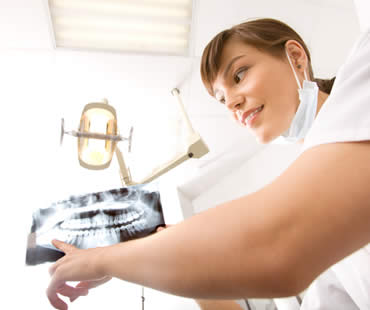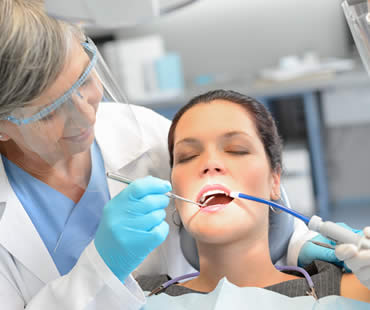
More and more people today are heading to their dentist’s office to brighten their smiles through teeth whitening treatments. Although you can try to maintain white teeth by limiting foods and drinks that stain or stopping habits like smoking, the truth is that teeth are prone to discoloring over time. If you’re considering undergoing teeth whitening, get the facts before you go.
Is teeth whitening safe?:
Most people are able to have their teeth whitened successfully without any issues. However, not everyone has good enough oral health to safely undergo treatment. Healthy teeth and gums are necessary so that the procedure is comfortable and effective. Patients with extensive fillings or crowns may not be the best candidates. Teeth that have extremely dark stains or discolorations from certain things like medications may not attain desired results.
How do I know if I’m a good candidate?:
A complete oral examination by your licensed dentist is the best way to determine if teeth whitening is right for you. During the assessment, your dentist will look for decay, receding gum lines, fillings, enamel condition, tooth sensitivity and more to decide if treatment is advised. Sometimes dental work can be done to restore oral health and then whitening becomes an option.
What is the process?:
Most professional teeth whitening treatments performed in a dental office are done with a high concentration peroxide bleaching agent and enhanced with special lighting to activate the gel. The dentist usually coats your gums with a product to limit sensitivity, and then the bleaching gel is carefully placed onto your teeth. Light is directed to the area, typically in three 15-minutes sessions. The dentist monitors the entire process for your safety and comfort.
What results can I expect?:
It is important to discuss your specific case with your dentist prior to treatment so that you have realistic whitening goals in mind. The degree of whitening often depends on the level and cause of your tooth discoloration. Some patients achieve a couple of shades brighter, while others whiten up to ten shades.
If you live in the Fernandina Beach area contact us today

If oral surgery is in your future, you might be worried about what’s to come. The way to relieve that worry is to talk to your oral surgeon. Your oral surgeon has the experience and knowledge necessary to guide you through whatever concerns or questions you may have. Here is a guide to some of those questions and answers:
How will I handle pain following surgery?
- In many cases, you will have been prescribed narcotic pain relievers. If you are taking narcotics, take them only as recommended and do not mix them with over-the-counter pain relievers or alcohol. Driving while on narcotics is dangerous and can have serious consequences for you personally and for others. If you weren’t prescribed any medication, use anti-inflammatory analgesics such as ibuprofen or naproxen sodium.
What will happen to my stitches in the days following surgery?
- Some stitches will be designed to dissolve over time and will not need to be removed. Others will not come out on their own and will need to be removed at a subsequent appointment. In many cases, losing a single stitch or two in the days following surgery isn’t serious; however, for bone-graft treatments, it is problematic and you should contact your surgeon immediately.
Can I eat normally after surgery?
- Immediately after surgery when you’re still experiencing any mouth or tongue numbness, don’t eat anything. You could mistake the soft tissues of your mouth for food and do serious damage to your mouth without realizing it. After your numbness subsides, consume soft foods of tepid temperatures for several days to allow for healing. Talk to your surgeon to learn when you can resume normal eating patterns as dictated by your particular surgery.
What other tips do you have?
- Stay hydrated and rest as much as possible to facilitate complete and quick healing. Call your surgeon if you have excessive bleeding or pain that doesn’t lessen with time. Be aware of signs of infection (swelling, redness, odorous or sour discharge) at the surgical site and seek professional care when needed.
We look forward to seeing you in our Fernandina Beach dental office

Do you have apprehensions regarding dental exams or therapies? Do you find yourself worrying about your teeth and concerned about exams? You are not alone. Many people experience anxiety or fear regarding the dentist’s office. You might want to consider sedation dentistry.
Qualified sedation dentists are able to work with you to get the dental care you require without the burden of fear or nervousness that might lead you to postpone work.
Sedation dentistry therapies are overseen and administered by specially trained dentists and dental technicians. These dental professionals have undergone hours and hours of special education in sedation equipment, techniques and medications. These trained individuals are aware of the best sedation options for each patient type, and they can administer them safely and reliably.
If you are thinking about sedation dentistry for your next dental treatment, consider the following:
- How much education does the dentist have related to sedation dentistry? What continuing education programs have been completed that specialize in anesthesia and conscious sedation?
- What organizations does the dentist belong to that provide ongoing education to keep the dentist and staff apprized as to the latest techniques and research? A good sedation dentist is always looking to learn new procedures that can benefit his or her patients, and can do so through professional organizations such as the American Dental Society of Anesthesiology.
- What equipment is in place to monitor a patient’s level of sedation? Sedation dentistry cannot be safely practiced without a pulse oximeter and oxygen equipment. Medications should be on-hand to reverse any rare reactions to the sedation.
It’s your right as a patient to have answers to these and all of your questions before you undergo any dental therapy. Your dentist should be very forthcoming. Having the right information allows you to make the right decisions for you and your dental care. Talk to your dentist today regarding these and any questions you have about sedation dentistry or his or her qualifications. Get the best care you need, and skip the worry!
We look forward to seeing you in our Fernandina Beach dental office

Today’s cosmetic dentistry offers an extensive array of treatments and procedures to help restore a beautiful and healthy smile. While you may never have considered cosmetic dental procedures as a solution to your dental concerns, there are quite a few reasons you may want to consider for seeking cosmetic dental treatment:
- Crooked, cracked or decayed teeth can be corrected through bonding, crowns, and veneers, returning your smile to its once vibrant and healthy appearance.
- Decay and disease can cause you to lose teeth, creating gaps that hollow your face and age your appearance. Cosmetic dentistry offers a wide variety of options such as dental implants for restoring missing teeth, keeping your smile and face younger looking.
- Teeth that have yellowed or discolored over time due to wine, tobacco or staining foods can be lightened up to ten shades with professional teeth whitening treatments performed by a qualified cosmetic dentist.
- “Horsey” looking teeth or “gummy” smiles can be corrected through gum re-contouring or restructuring to create a younger, more appealing smile.
- Misaligned or gapped teeth can be straightened through orthodontia such as Invisalign that is virtually invisible and pain and hassle-free.
Some cosmetic treatments may be offered by your family dentist, but you may want to consider a consultation with a qualified cosmetic dentist to find out more about the full array of treatments available to address your cosmetic dental concerns. Many procedures are quick and painless, and can be combined with other cosmetic treatments to achieve the results you desire. With the help of cosmetic dentistry and proper oral care, you can be assured a confident, more perfect smile.
Our dental office is located in Fernandina Beach

Facing dental issues are a fact of life, no matter your age. The likelihood is almost certain that at least one member of your family will require dental treatment at some point, not to mention the need for regular checkups and cleanings. The promise of dental care being required by every family member means that it can be beneficial to have a family dentist who can take care of each one’s oral health.
Although you might choose to seek oral care from a general dentist, there are some unique advantages that family dentists offer. First and foremost, a family dentist treats every member of your family no matter their age. This type of dental practice is comfortable handling any age group, while a general practice might not be as prepared for the young and old and everyone in between.
Another benefit is that you can find a single family dental practice and not have to keep looking for a dentist for each family member. You can convey your family information one time to one office, and the staff will get to know all of you. The dentist and staff will learn about the oral health of every family member, and you can feel confident that each person is receiving the same quality care.
Once you choose a family dentist, everyone will know what office to go to and may even be able to make joint appointments. It will be easy to communicate with a single location, and you’ll grow comfortable in dealing with the same group of people for every family member. Many people appreciate having a long-term professional healthcare relationship, and feeling confident in the care and experience each member of your family will have there.
Our dental office is located in Fernandina Beach

It is vital for parents to understand not to wait until an oral health problem arises to begin dental treatment for their kids. Parents should be aware that in order for children to have the best chance for healthy teeth and gums throughout life, preventive dentistry is one of the keys.
Good oral care should begin when your child is an infant. As soon as babies start drinking milk, sugars can attack the gums even though there aren’t any teeth yet. To avoid damage, clean your child’s gums by gently rubbing them with a damp soft cloth. Around age one, schedule your child’s first appointment with the dentist. The examination will include looking for any issues, teaching home care, and allowing your child to become accustomed to a dentist setting.
As you child grows, dentists and parents can partner together to teach preventive dentistry habits to children. Dentists can show parents the ideal ways to guide children in proper brushing and flossing, and parents can ensure that the methods are carried out consistently at home. You and your dentist may decide together as your child grows whether to opt for dental sealants to help protect your child’s teeth from potential decay and cavities.
Another aspect of good oral health that parents should be involved in is providing nutritious foods for their children. Your dentist can educate your family on the best foods for your teeth and gums, as well as the foods and drinks to avoid. Some items are known to contribute to tooth decay, gum disease, and staining. Teaching your child to make healthy diet choices will promote a healthy mouth.
Preventative dentistry both at home and in your dentist’s office will make your child feel confident about oral care and become comfortable with the dentist. If the time comes for more extensive services, your child will likely trust the dentist and have less apprehension about the dental visit. Good preventive care, however, helps avoid problems and your child will be less likely to encounter major problems requiring painful procedures and lots of time in the dental chair.
If you live in the Fernandina Beach area contact us today







